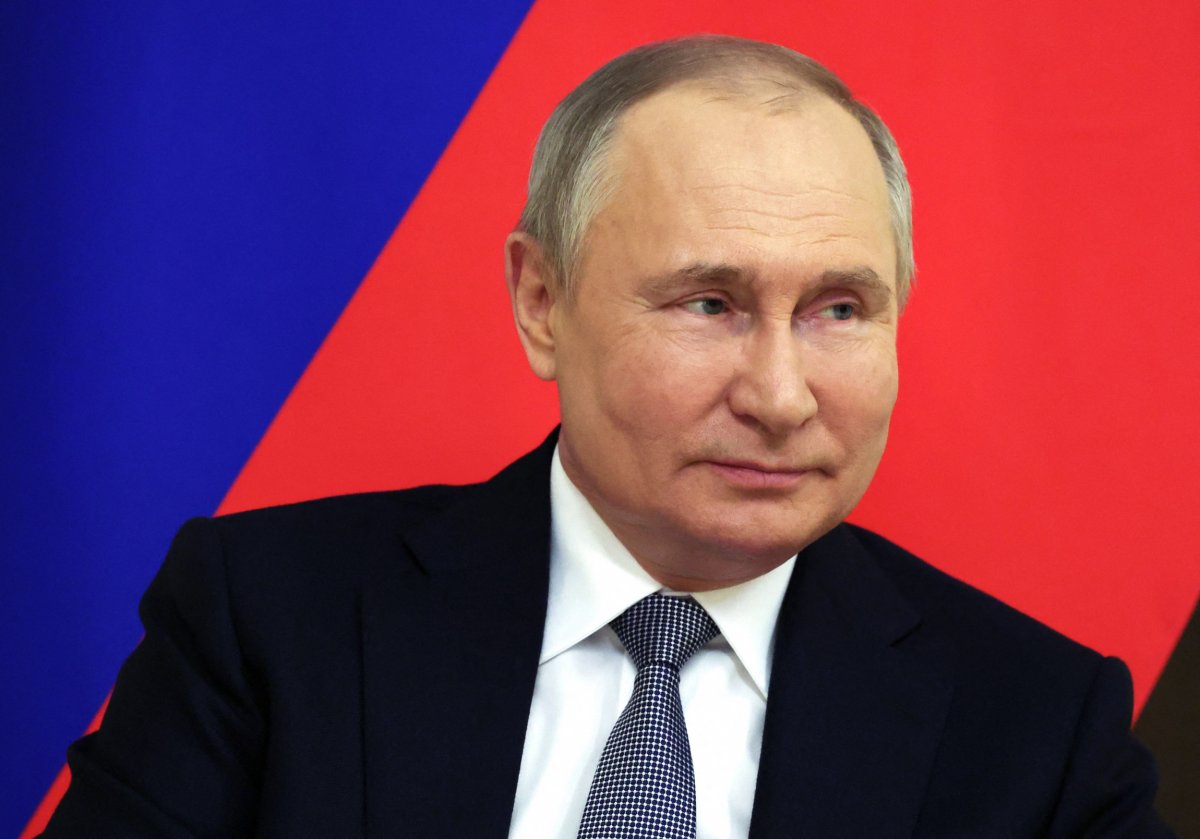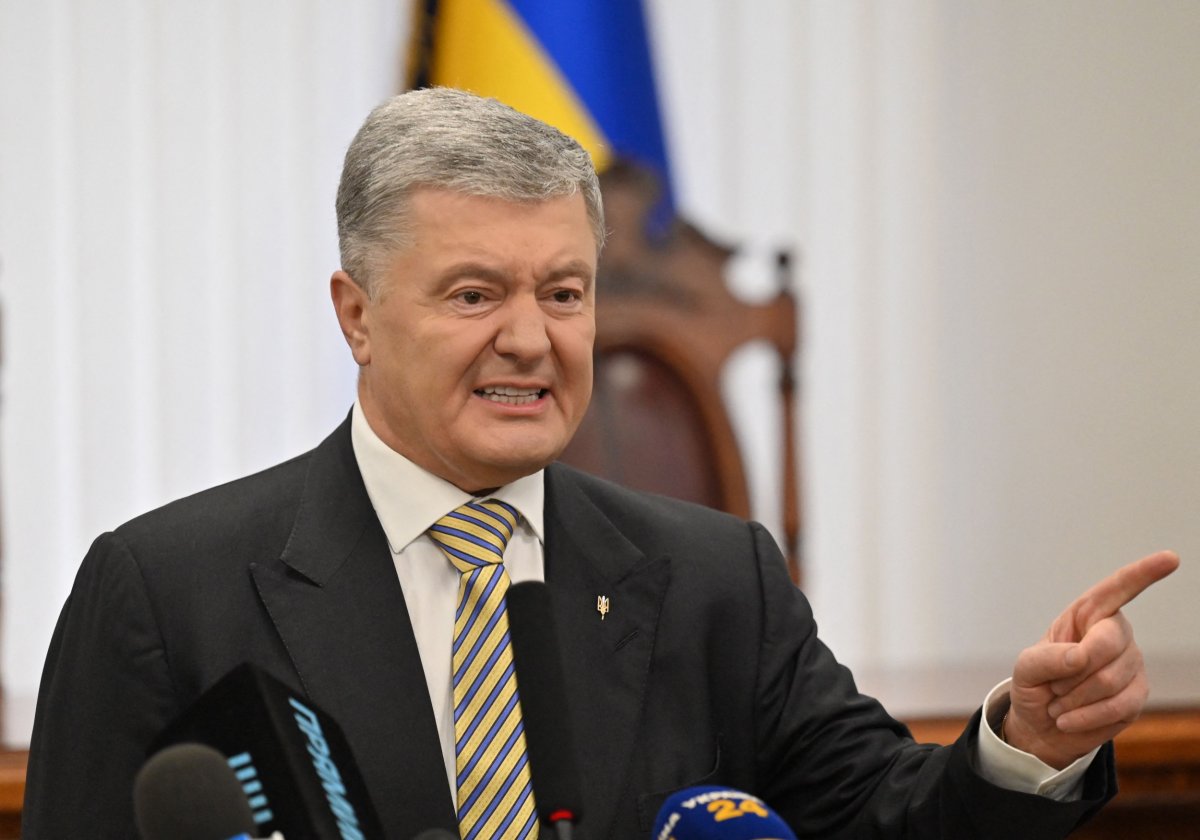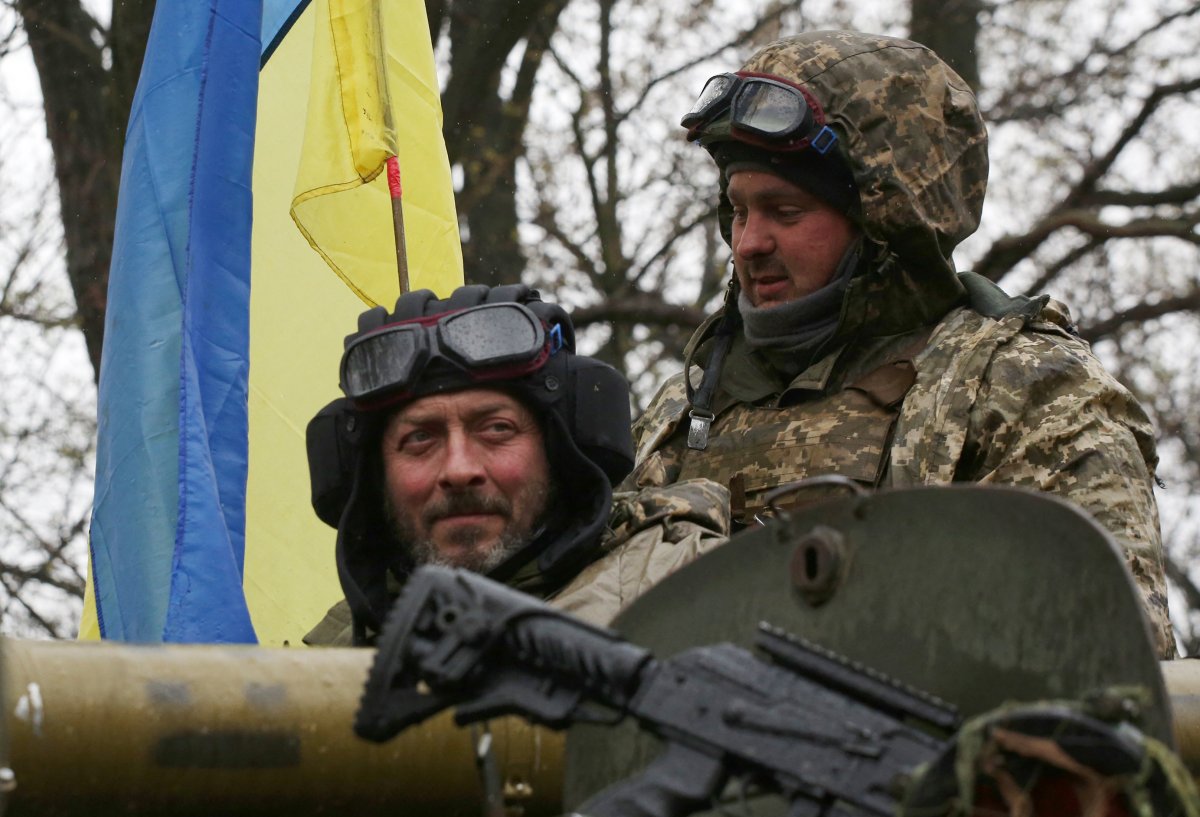Former Ukrainian President Petro Poroshenko is calling on the Western allies to formalize a broad coalition against Russian President Vladimir Putin and detoxify Russia of the authoritarian and aggressive politics of the dictator and his allies.
In an interview with Newsweek, Poroshenko—who was elected after the pro-Western Maidan Revolution in 2014 and served until 2019—said this coalition must have ambitions larger than defeating Moscow in Ukraine and look to "de-Putinize Russia."
The NATO-EU pro-Ukraine coalition should become an anti-Putin alliance, Poroshenko said, comparing Putin's aggression with that of Nazi dictator Adolf Hitler. "I think in general an anti-Putin coalition already exists, and now we just need to formalize this coalition around the world," he said.

Poroshenko warned that he is "absolutely confident that Russia has the fate of a very, very big North Korea," adding: "No freedom, a dictatorship, full control of mass media, unhappy and poor people."
"It's possible to minimize this result," he said, by removing Putin from power and influence. "We should very attentively make a de-Putinization of Russia."
This will come with costs to the Russian people. But, Poroshenko said, this is a necessary evil.
"I'm absolutely confident that within a few months, the results of the sanctions will be disastrous for the Russian economy, disastrous for the people who are already poisoned by Russian TV and support the barbarian aggression against the Ukrainian people."
"They should pay the price for that. Learn the lessons, stop the aggression, give back Ukrainian soil, and then do their best to save Russia."
In the meantime, Poroshenko urged Western leaders to be skeptical of the Kremlin.
"Don't trust Putin, because when I was president, for five years I had many negotiations with him. Nothing he promised was really implemented. Don't be afraid of Putin. Putin goes as far as we allow him to go."
He added: "I think the war can end in only two ways: By our victory, the victory of the whole world, or by capitulation by the whole world to Putin. I definitely do not believe in the second scenario."
Newsweek has contacted the Russian Foreign Ministry to request comment. Russia has criticised Western countries for imposing sanctions on its economy and for backing Ukraine, saying they are inflaming the conflict. Moscow has long accused the United States and its allies of seeking to undermine Putin.
Poroshenko made headlines early in the invasion when he formed a territorial defense unit in Kyiv, which foreign observers and politicians expected to fall to Russian advances within days.
Weapon in hand and decked out in tactical clothing, Poroshenko symbolized the resistance fervor that bogged down Russian troops and prompted a wave of Western support for Ukraine.
At times, Poroshenko said his unit was within five miles of Russian positions on the northwestern outskirts of the capital. The former commander-in-chief became one of hundreds of thousands of volunteers, who created defensive positions and helped evacuate civilians.
Poroshenko's group helped evacuate some 20,000 people from the Kyiv suburbs, he said, while under constant artillery, missile, and air bombardment. Seven members of Poroshenko's unit were killed.
"It's a different universe, before and after February 24, in Ukraine and definitely also in the world," Poroshenko said. "We fought with the Russians throughout my presidential term from 2014 to 2019, now I cannot stay aside and hide...I am absolutely confident that every democratic president in my shoes in any country would have done the same."
Poroshenko and his unit were among the first who pushed into Irpin, Bucha, Hostomel, Vorzel, and other Kyiv suburbs after the Russian withdrawal. These names have become bywords for atrocity, their streets and homes littered with civilian corpses apparently killed by the Russian occupiers—suspected war crimes that Moscow denies.
The horrific scenes helped coalesce international support for Ukraine.
"For normal people it's impossible to sleep after what we saw," Poroshenko said. "This is how Putin and how Russia wants to see Ukraine. We understand that we will fight until victory, we simply don't have any other option."
The Russian defeat north of Kyiv was seen as a major embarrassment for the Kremlin, where Putin and his top officials appear to have misjudged the willingness and ability of Ukrainians to fight and the West to support them.

Poroshenko said the battle around the capital was "a historic victory for Ukraine," though warned the Russian withdrawal from the north does not mean Kyiv is entirely safe, not least because the city is still under daily attack from Russian bombs and missiles.
"Is it possible that Russia will return? Definitely, yes," Poroshenko said. "We should ask this question not of Russian military generals, but of Putin's therapist," he added, describing the Russian leader as "completely unpredictable."
"Putin wants to have all of us dead, but we want to live. Putin wants to erase our country from the world map. But we have one of the world's greatest countries, with a 1,000-year history, which is capable of defending itself and winning the battle, with the assistance of the whole world."
Ukrainian leaders have lauded Western assistance as invaluable, though have repeatedly said that the fastest way to end the war in Kyiv's favor is by sending more weapons and introducing tougher sanctions on Russia's isolated economy.
Western support is even more vital as the war enters a new phase. Having withdrawn from the north, the Russians are now focusing on the east, hoping to take back the initiative and secure some much-needed victories. President Volodymyr Zelensky said this week that the battle for Donbas has now begun.
"We'll do our best," Poroshenko said of the battle, which Ukraine's Foreign Minister Dmytro Kuleba said will be reminiscent of World War Two-era combat.
Poroshenko recently traveled to the eastern city of Kramatorsk, close to the front line and the site of a recent Russian missile strike on a train station packed with evacuating civilians. At least 57 were killed, with another 190 injured. Russia has denied responsibility, instead blaming Ukraine.
The former president said the city was nearly deserted. But those planning to defend it are motivated and ready.
"We Ukrainians will never give up," he said. "We'll never accept Russia. The barbaric, disastrous massacres which we see from Mariupol to Hostomel definitely demonstrate the meaning of 'Russkiy Mir'—the Russian world—for us Ukrainians."
Western backing, Poroshenko and many other Ukrainian leaders have said, could be decisive in Donbas.
Another substantial defeat for Putin in the east would be a disaster for a war that Moscow characterizes as a "special operation" in Ukraine.
"We here fight not only for us, or for our children, or for our families, or for our future, but definitely fight for the West," Poroshenko said.
"Putin isn't fighting us because he needs more land. No, he hates the West, he hates freedom, he hates democracy, he hates successful nations, the European Union or U.S. who can demonstrate that there is another standard of living, which is deathly dangerous for Putin.
"That's why we Ukrainians now are giving our lives for the whole world. My message is please, help us to do your job."
'Game-changers'
The stalled peace talks have secured some humanitarian and evacuation corridors, but nothing else of note. Many in Ukraine believe Putin considers the talks a way to buy time for redeployment, and a means to gather intelligence on his Ukrainian adversaries.
There is little expectation that peace talks—beset by suspicions and intrigue—will resume or make serious progress until the Donbas battle has been fought out. Poroshenko said any peace deal must include full Russian withdrawal from all occupied Ukrainian territory, something Putin is unlikely to agree to.
"We should have an immediate ceasefire," Poroshenko said. "There is no explanation for why Putin continues to kill Ukrainians with cruise missiles and aerial bombs."
All hostages and prisoners from both sides should be released, after which Russian forces should "release all Ukrainian soil," Poroshenko said. "Four, launch the security negotiations, but only after the implementation of all three other things."
Russia's invasion spurred an unprecedented Western response, though there have been multiple public disagreements among European Union and NATO allies about what level of material support for Ukraine and sanctions on Russia is appropriate.
Ukrainian demands for Western sanctions on Russia before the invasion went unmet. Kyiv's position is that these might have dissuaded Putin from attacking, though in Brussels the belief was that such action might prompt escalation.
"I'm very much appreciative, the West has already done a lot," Poroshenko said. "It would have been significantly better if the West would have done that earlier, one year ago, half a year ago.
"I've said the more weapons we receive, the shorter the path to peace. If we received these weapons one year ago, maybe that would be the factor to stop Putin from this aggression.
"If we received these types of weapons in 2014, maybe we would have thrown Russians out of the occupied territories."
Now, Poroshenko said, Ukraine needs "game-changers."
Several hundred tanks, armored personnel carriers, artillery systems, fighter jets, surface-to-air anti-aircraft systems, drones, counter-battery radars, and anti-ship missiles would be among the arms that would "definitely change the game," he said.
"Can you imagine that not only the fate and future of Ukraine, but the fate and future of the whole continent, the whole world, could depend on such a small figure as 300 tanks?
"We need these now. Not in one week, because Ukraine will pay a significant price for delays."
Ukraine's war is Europe's war, Poroshenko said: "Putin is going to go as far as we allow him to go. If he is successful in Ukraine, tomorrow he will knock at the door of the Baltic states and Poland, Bulgaria, Romania, Moldova, half of the continent.
"It's easier and more effective to stop him here in Ukraine, where we've created one of the strongest armies on the continent."
That army, which has defied pre-war expectations in Moscow, Brussels, and Washington, D.C., increasingly looks like it will not be allowed to join NATO. Ukraine's constitution still enshrines its ambition to become a full NATO and EU state, but Ukrainian military neutrality is a key Russian goal in the stalled peace talks.
Zelensky appears to have all but accepted the demand, hoping instead for an alternative security guarantee from the alliance's leading nations.
Poroshenko, the president who oversaw the adding of NATO and EU ambitions to the national constitution, said NATO membership is still the best protection for Kyiv.
"I'm confident that there is no other form of security guarantee like Article V of the Washington Treaty," he said, referring to the alliance's commitment to collective defense in the event of outside aggression.
Ukraine, along with Georgia, was approved as a future NATO member at the 2008 alliance summit in Bucharest. But Kyiv was never given a Membership Action Plan, a roadmap to accession.
"If in 2008, Ukraine received a NATO Membership Action Plan, if Ukraine got full membership in 2013, definitely there would have been no aggression," Poroshenko said.
"But at that time, some leaders were afraid to make Putin angry. This is a dead end. Don't be scared to make Putin angry, because Putin only understands force."
The West, he said, must not err again: "This is unacceptable when any country claims the right of changing borders by force after World War Two. This is a very dangerous precedent. And Putin will never stop.
"If he now changes the borders of Ukraine, tomorrow he will want to change the borders of Germany because he wants to return to Dresden where he served as a KGB agent. Or maybe the day after tomorrow he will want to do exactly the same with Alaska, because in the 19th century Alaska belonged [to Russia]."
Russia demanded that Ukraine be permanently excluded from NATO in the weeks and months leading up to its February invasion. This proposal was rebuffed by the alliance and by Kyiv, who both argued that Putin should have no say in the security situation of other nations.
Poroshenko urged leaders to stay true to that ideal. "We Ukrainians and all Europe should not give any veto right to security decisions," he said.
"Our membership, under our constitution, depends on the will of the Ukrainian people and from every single member of NATO. Putin is neither Ukrainian nor a NATO member.
"Nothing depends on Putin, I hate the idea and can't allow Putin to dictate the world's future.
"This future would be extremely bad, extremely dangerous, extremely undemocratic, no freedom, disastrous. That's why we Ukrainians are paying such a high price fighting Putin here in Ukraine with the support of the whole world."
Poroshenko has already released his own five-point peace plan. It calls for a lend lease program from the U.S.—already unanimously approved by the Senate; a plan to close the sky to Russian aircraft by providing Ukraine with jets and anti-air systems; tougher sanctions including cutting off all Russian banks from SWIFT; a new Marshall Plan to help rebuild Ukraine; and fast-tracked approval for Ukraine to join the EU before the end of 2022.
The lend lease proposal has not yet been approved by the House of Representatives. "Please, congressmen, vote on it as soon as possible, from nutrition to ammunition," Poroshenko said.
The exemption of certain Russian banks from the SWIFT ban, he added, is "completely unacceptable...You already support Ukraine with more than $2 billion, but at the same time you pay Russia $42 billion...Every single penny from this $42 billion is financing the killing of Ukrainians and we definitely cannot accept that."
His proposed Marshall Plan, whether initiated by the U.S., EU, or some combination of both, will give hope to the Ukrainians whose economy and infrastructure are being destroyed.
"Ukraine should be confident that we have a light at the end of the tunnel," he said.
"Money of the aggressor Russian Federation, which is frozen by the sanctions, should be redirected for the process of restoring the Ukrainian state. By the way, that will also be a resource to compensate for the expenditure of the Western world in supplying Ukraine with weapons."

"I am going to use this opportunity to thank the leaders who sent me a letter and gave me an answer, including [British Prime Minister] Boris Johnson and many others," Poroshenko said of his peace proposals. "I'm very much appreciative of that."
"We appreciate our allies," Poroshenko continued, despite the many disagreements between the individual partners and Kyiv. Germany and Hungary have been especially criticized for their hesitancy or refusal to back further sanctions and weapons transfers.
Hungarian Prime Minister Viktor Orban—who earlier this month secured another term in power—has been particularly reluctant.
"I know Viktor very well," Poroshenko said. "The election has already happened, please, return back to the civilized world, don't be under the umbrella of Putin. That is an umbrella of the devil, and nobody can survive under this umbrella.
"We need EU unity. We need NATO unity. We need Western unity. We need global leadership of the European leaders including every single member of the European Union.
"The unity of Ukrainians surprised Putin...And definitely the world was surprised by the global unity, because Putin expected that he could find some weak nation who could undermine the unity of NATO and undermine the unity of the global coalition against Putin."
U.S. support to date, Poroshenko said, has been invaluable. "I want to thank the American people, the American president, the American Congress, the American administration, and the whole world for this leadership," he said.
"This is our unity. This is the greatest factor for our future victory. I have no doubt about that."
Uncommon Knowledge
Newsweek is committed to challenging conventional wisdom and finding connections in the search for common ground.
Newsweek is committed to challenging conventional wisdom and finding connections in the search for common ground.
About the writer
David Brennan is Newsweek's Diplomatic Correspondent covering world politics and conflicts from London with a focus on NATO, the European ... Read more
To read how Newsweek uses AI as a newsroom tool, Click here.






